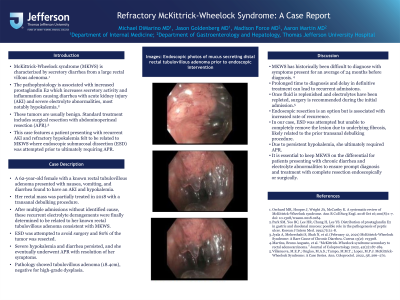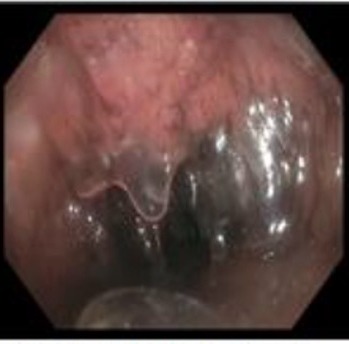Sunday Poster Session
Category: Colon
P0373 - Refractory McKittrick-Wheelock Syndrome: A Case Report
Sunday, October 27, 2024
3:30 PM - 7:00 PM ET
Location: Exhibit Hall E

Has Audio

Michael J. DiMarino, MD
Thomas Jefferson University Hospital
Philadelphia, PA
Presenting Author(s)
Michael J. DiMarino, MD1, Jason Goldenberg, MD1, Madison Force, MD1, Aaron Martin, MD2
1Thomas Jefferson University Hospital, Philadelphia, PA; 2Thomas Jefferson University Hospital, Newtown Square, PA
Introduction: McKittrick-Wheelock syndrome (MKWS) is characterized by secretory diarrhea from a large rectal villous adenoma. The pathophysiology is associated with increased prostaglandin E2 which increases secretory activity and inflammation causing diarrhea with acute kidney injury (AKI) and severe electrolyte abnormalities, most notably hypokalemia. These tumors are usually benign. Standard treatment includes surgical resection with abdominoperineal resection (APR). This case features a patient presenting with recurrent AKI and refractory hypokalemia felt to be related to MKWS where endoscopic submucosal dissection (ESD) was attempted prior to ultimately requiring APR.
Case Description/Methods: A 62-year-old female with a known rectal tubulovillous adenoma presented with nausea, vomiting, and diarrhea found to have an AKI and hypokalemia. Her rectal mass was partially treated in 2018 with a transanal debulking procedure but she declined recommended APR due to morbidity of the surgery. She subsequently had recurrent hospitalizations with diarrhea, AKI and severe, persistent hypokalemia over the next 5 years. After multiple admissions without identified cause, these electrolyte derangements were finally determined to be related to her known rectal tubulovillous adenoma consistent with MKWS. ESD was attempted to avoid surgery and 80% of the tumor was resected but could not be entirely removed. Severe hypokalemia, requiring daily intravenous repletion, persisted and she eventually underwent APR with resolution of her diarrhea and hypokalemia. Pathology showed tubulovillous adenoma (18.4cm), negative for high-grade dysplasia.
Discussion: MKWS has historically been difficult to diagnose with symptoms present for an average of 24 months before diagnosis. Prolonged time to diagnosis and delay in definitive treatment can lead to recurrent admissions. Once fluid is replenished and electrolytes have been repleted, surgery is recommended during the initial admission. Endoscopic resection is an option but is associated with increased rate of recurrence. In our case, ESD was attempted but unable to completely remove the lesion due to underlying fibrosis which is likely related to the prior transanal debulking procedure. The patient continued to have significant hypokalemia and ultimately required APR. It is essential to keep MKWS on the differential for patients presenting with chronic diarrhea and electrolyte abnormalities to ensure prompt diagnosis and treatment with complete resection endoscopically or surgically.

Disclosures:
Michael J. DiMarino, MD1, Jason Goldenberg, MD1, Madison Force, MD1, Aaron Martin, MD2. P0373 - Refractory McKittrick-Wheelock Syndrome: A Case Report, ACG 2024 Annual Scientific Meeting Abstracts. Philadelphia, PA: American College of Gastroenterology.
1Thomas Jefferson University Hospital, Philadelphia, PA; 2Thomas Jefferson University Hospital, Newtown Square, PA
Introduction: McKittrick-Wheelock syndrome (MKWS) is characterized by secretory diarrhea from a large rectal villous adenoma. The pathophysiology is associated with increased prostaglandin E2 which increases secretory activity and inflammation causing diarrhea with acute kidney injury (AKI) and severe electrolyte abnormalities, most notably hypokalemia. These tumors are usually benign. Standard treatment includes surgical resection with abdominoperineal resection (APR). This case features a patient presenting with recurrent AKI and refractory hypokalemia felt to be related to MKWS where endoscopic submucosal dissection (ESD) was attempted prior to ultimately requiring APR.
Case Description/Methods: A 62-year-old female with a known rectal tubulovillous adenoma presented with nausea, vomiting, and diarrhea found to have an AKI and hypokalemia. Her rectal mass was partially treated in 2018 with a transanal debulking procedure but she declined recommended APR due to morbidity of the surgery. She subsequently had recurrent hospitalizations with diarrhea, AKI and severe, persistent hypokalemia over the next 5 years. After multiple admissions without identified cause, these electrolyte derangements were finally determined to be related to her known rectal tubulovillous adenoma consistent with MKWS. ESD was attempted to avoid surgery and 80% of the tumor was resected but could not be entirely removed. Severe hypokalemia, requiring daily intravenous repletion, persisted and she eventually underwent APR with resolution of her diarrhea and hypokalemia. Pathology showed tubulovillous adenoma (18.4cm), negative for high-grade dysplasia.
Discussion: MKWS has historically been difficult to diagnose with symptoms present for an average of 24 months before diagnosis. Prolonged time to diagnosis and delay in definitive treatment can lead to recurrent admissions. Once fluid is replenished and electrolytes have been repleted, surgery is recommended during the initial admission. Endoscopic resection is an option but is associated with increased rate of recurrence. In our case, ESD was attempted but unable to completely remove the lesion due to underlying fibrosis which is likely related to the prior transanal debulking procedure. The patient continued to have significant hypokalemia and ultimately required APR. It is essential to keep MKWS on the differential for patients presenting with chronic diarrhea and electrolyte abnormalities to ensure prompt diagnosis and treatment with complete resection endoscopically or surgically.

Figure: Endoscopy photo of mucus secreting distal rectal tubulovillous adenoma prior to endoscopic intervention.
Disclosures:
Michael DiMarino indicated no relevant financial relationships.
Jason Goldenberg indicated no relevant financial relationships.
Madison Force indicated no relevant financial relationships.
Aaron Martin indicated no relevant financial relationships.
Michael J. DiMarino, MD1, Jason Goldenberg, MD1, Madison Force, MD1, Aaron Martin, MD2. P0373 - Refractory McKittrick-Wheelock Syndrome: A Case Report, ACG 2024 Annual Scientific Meeting Abstracts. Philadelphia, PA: American College of Gastroenterology.
